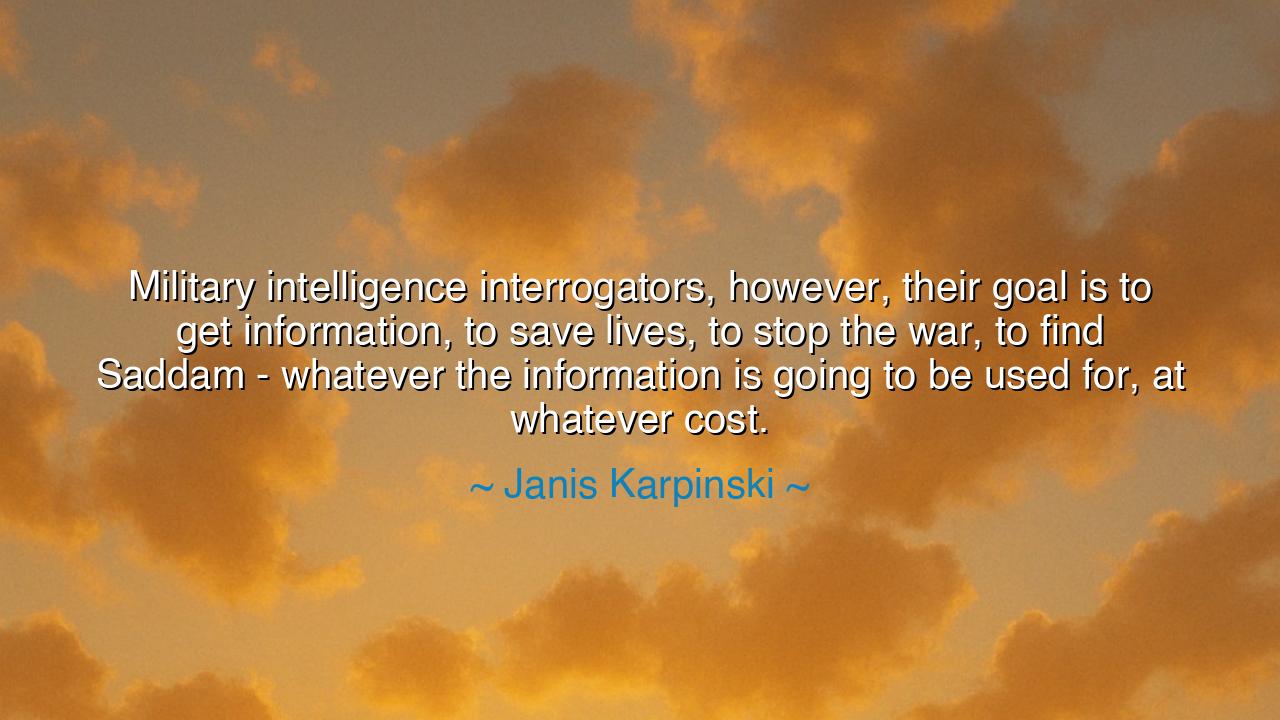
Military intelligence interrogators, however, their goal is to
Military intelligence interrogators, however, their goal is to get information, to save lives, to stop the war, to find Saddam - whatever the information is going to be used for, at whatever cost.






When Janis Karpinski, a brigadier general in the United States Army, spoke the words, “Military intelligence interrogators, however, their goal is to get information, to save lives, to stop the war, to find Saddam—whatever the information is going to be used for, at whatever cost,” she spoke from the crucible of conflict and moral ambiguity. Her words emerge from the shadowed halls of war, from the years of the Iraq conflict, where ideals of justice, duty, and humanity were tested by the relentless demands of survival and command. Beneath her statement lies the tension between necessity and conscience, between the pursuit of safety and the cost of the methods used to achieve it.
In her role as commander at Abu Ghraib prison, Karpinski witnessed firsthand how the pursuit of information could blur the boundaries of right and wrong. Her words carry the weight of a soldier’s burden—a recognition that in times of war, intelligence becomes as powerful as the sword, and those who wield it walk a perilous path. The phrase “at whatever cost” is both declaration and lament. It reveals the soldier’s understanding that, in the chaos of conflict, moral clarity is often the first casualty. Yet it also bears an ancient echo: the eternal struggle of humanity to reconcile ends and means, purpose and price.
To the ancients, such a dilemma was not foreign. In the writings of Thucydides, chronicler of the Peloponnesian War, we find that war is a teacher of extremes—it reveals both the noblest and the darkest capacities of mankind. When Karpinski speaks of interrogators seeking information “to stop the war,” she mirrors the tragic irony found in every generation of warriors: that one must sometimes wade through violence in the name of peace. The question that has haunted every empire, every general, and every soul since time began is whether peace purchased by cruelty is truly peace at all.
History remembers too the tale of Marcus Aurelius, the philosopher-emperor, who led his armies with both steel and mercy. He understood the necessity of discipline, but he warned his soldiers never to become what they fought against. “The soul,” he wrote, “becomes dyed with the color of its thoughts.” Karpinski’s words, though spoken in another age, reflect this same warning. For when one says “at whatever cost,” one must remember that the greatest cost is not always material—it is moral. The stain left upon the conscience of a people can last longer than any war.
And yet, we must not judge too hastily. The world of the interrogator is one of immense pressure, where each decision might mean the difference between life and death. The goal to save lives, to prevent bloodshed, to stop the enemy—these are not hollow ambitions. They are the heavy responsibilities of those entrusted with the protection of others. The soldier who interrogates a prisoner in the dead of night does so not for pleasure, but from a desperate sense of duty. The fire that burns in them is not cruelty—it is fear, hope, and the terrible knowledge that hesitation might lead to greater suffering.
But here lies the paradox that Karpinski’s words expose: when one begins to act “at whatever cost,” cost itself becomes invisible. The line between protector and oppressor begins to fade, and humanity risks losing itself in the pursuit of victory. What begins as necessity can harden into habit, and what is justified in war can corrode the soul in peace. The ancients warned of this too: when Alexander the Great conquered half the known world, his victories left behind not only cities but scars—reminders that power unchecked by reflection becomes destruction.
So let the lesson be spoken clearly to those who hear: in all pursuits, the method matters as much as the goal. To win at the expense of one’s soul is no victory at all. Whether in war, in politics, or in the private battles of life, one must never forget that righteousness is measured not by success, but by integrity. The warrior’s true honor lies not in the spoils he wins, but in the conscience he keeps intact.
And to the generations that follow, remember Karpinski’s words not as an endorsement, but as a warning born of experience. When you face the storms of duty, when you must choose between expedience and virtue, pause and look inward. Ask yourself: At what cost? For every action, however justified, leaves an imprint upon the soul. Strive, then, to fight your battles—whether on fields of war or in the quiet chambers of decision—with courage, compassion, and restraint. Only then can peace, when it comes, be pure and enduring.






AAdministratorAdministrator
Welcome, honored guests. Please leave a comment, we will respond soon